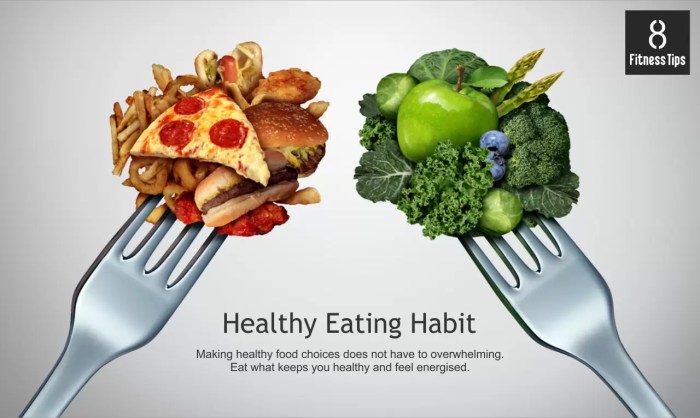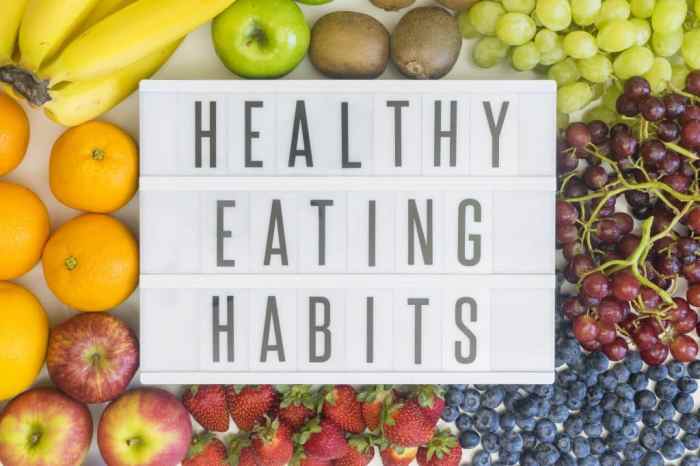Yo, check it – we’re diving into Healthy Eating Habits, making sure you know how to fuel your body right. Get ready for a journey that’ll have you feeling fresh and energized!
From understanding the benefits to mastering meal prep, we’ve got all the juicy deets on how to keep your eating habits on point.
Benefits of Healthy Eating Habits
Eating a balanced diet is crucial for maintaining good health and overall well-being. It provides the body with the necessary nutrients to function properly and helps prevent various health conditions.
Importance of a Balanced Diet
A balanced diet consists of a variety of foods that offer essential nutrients such as vitamins, minerals, protein, carbohydrates, and fats in the right proportions. This helps the body perform at its best and supports overall health.
Hey, have you checked out the latest buzz on Mobile Marketing Essentials ? It’s all about mastering the art of reaching your audience through their phones, ya know what I’m sayin’? From SMS campaigns to mobile apps, this guide covers it all. Stay ahead of the game and level up your marketing skills with this essential resource!
Contribution to Overall Well-being
- Healthy eating habits can boost energy levels and improve mood, leading to better mental health.
- Adequate nutrition supports a strong immune system, reducing the risk of illnesses and infections.
- Proper diet can help maintain a healthy weight and reduce the risk of chronic diseases like heart disease, diabetes, and cancer.
Essential Nutrients for Good Health
Vitamins and Minerals:
Vitamins like A, C, D, E, and K, along with minerals such as calcium, iron, and potassium, play vital roles in various bodily functions and maintaining health.
Protein:
Protein is essential for building and repairing tissues, supporting muscle growth, and maintaining a healthy metabolism.
Carbohydrates and Fats:
Carbohydrates are a primary source of energy, while healthy fats are important for brain function, hormone production, and absorption of fat-soluble vitamins.
Components of a Healthy Diet
Eating a balanced diet is crucial for overall health and well-being. It involves incorporating a variety of food groups to ensure you are getting all the essential nutrients your body needs.
Yo, check it out! If you wanna learn the ins and outs of Mobile Marketing Essentials, you gotta hit up this dope link: Mobile Marketing Essentials. It’s gonna level up your digital marketing game for real, so don’t sleep on it!
Food Groups in a Balanced Diet, Healthy Eating Habits
- Vegetables: Rich in vitamins, minerals, and fiber, vegetables should make up a large part of your daily meals. Aim to include a variety of colors to ensure you are getting a wide range of nutrients.
- Fruits: Another great source of vitamins, minerals, and fiber, fruits are essential for a healthy diet. Try to include whole fruits rather than fruit juices to get the most benefits.
- Protein: Protein is crucial for building and repairing tissues in the body. Include sources like lean meats, poultry, fish, beans, and nuts in your diet.
- Whole Grains: Whole grains provide fiber, vitamins, and minerals. Opt for whole grain bread, brown rice, quinoa, and oats over refined grains for better nutrition.
- Dairy: Dairy products are a good source of calcium, which is important for bone health. Choose low-fat or fat-free options to reduce saturated fat intake.
Significance of Portion Control
Portion control is key to maintaining a healthy weight. Even healthy foods can contribute to weight gain if consumed in large quantities. By being mindful of portion sizes, you can prevent overeating and manage your weight effectively.
Remember, it’s not just what you eat, but how much you eat that matters.
Incorporating Fruits and Vegetables
Adding fruits and vegetables to your meals can be easy and delicious. Try these tips to increase your intake:
- Start your day with a fruit smoothie or add berries to your breakfast cereal.
- Snack on raw vegetables with hummus or yogurt dip.
- Add extra veggies to soups, stews, and stir-fries for a nutrient boost.
- Include a side salad with lunch and dinner to increase your vegetable intake.
Meal Planning and Preparation

Planning and preparing meals in advance can greatly benefit your overall health and well-being. It allows you to make healthier food choices, control portion sizes, and save time during the week.
Advantages of Meal Prepping
- Helps in portion control and prevents overeating.
- Saves time during busy weekdays.
- Reduces the temptation of unhealthy fast food options.
- Can lead to cost savings by buying ingredients in bulk.
- Ensures a balanced diet by including a variety of nutrients in your meals.
Creating a Weekly Meal Plan
- Start by outlining your meals for the week, including breakfast, lunch, dinner, and snacks.
- Include a variety of fruits, vegetables, whole grains, lean proteins, and healthy fats in your plan.
- Consider batch cooking certain ingredients to use in multiple meals throughout the week.
- Make a grocery list based on your meal plan to avoid unnecessary purchases at the store.
- Allow for flexibility and don’t be afraid to swap meals if needed.
Cooking Techniques for Nutritious Meals
- Opt for cooking methods like steaming, grilling, baking, or sautéing instead of frying.
- Use herbs, spices, and citrus juices to flavor your dishes instead of excessive salt or sugar.
- Choose lean cuts of meat and remove visible fats before cooking.
- Experiment with different cooking oils like olive oil or avocado oil for added health benefits.
- Try incorporating more plant-based proteins like beans, lentils, or tofu into your meals.
Healthy Snacking
When it comes to maintaining a healthy diet, snacking plays a crucial role in keeping your energy levels up and preventing overeating during meals. Making smart choices when it comes to snacks can help curb unhealthy cravings and keep you on track with your nutrition goals.
Nutritious Snack Options
- Fresh fruits like apples, berries, and bananas
- Raw veggies such as carrots, cucumbers, and bell peppers
- Nuts and seeds like almonds, walnuts, and chia seeds
- Greek yogurt or low-fat cottage cheese
- Whole grain crackers or rice cakes
Avoiding Processed Snacks
- Opt for homemade trail mix with nuts, seeds, and dried fruits instead of store-bought granola bars
- Choose air-popped popcorn seasoned with herbs and spices instead of buttered microwave popcorn
- Swap out sugary snacks like candy and cookies for a piece of dark chocolate or a small portion of fruit
Importance of Mindful Eating
Snacking mindfully involves being aware of your hunger cues and eating with intention. Take the time to savor each bite, chew slowly, and listen to your body’s signals of fullness. This can help prevent mindless snacking and promote better digestion and satisfaction from your snacks.
Drinking Habits and Hydration: Healthy Eating Habits

Staying hydrated is crucial for overall health and well-being. Water plays a vital role in various bodily functions, such as regulating body temperature, aiding digestion, and transporting nutrients.
Ideal Daily Water Intake
- A common recommendation is to drink at least 8 glasses (64 ounces) of water per day.
- Individual water needs may vary based on factors like age, activity level, and climate.
- Factors like exercise, illness, or pregnancy may require increased water intake.
Impact of Sugary Beverages
- Sugary beverages like soda, energy drinks, and sweetened teas can contribute to weight gain and increase the risk of various health issues.
- High sugar intake from beverages can lead to dental problems and spike blood sugar levels.
- Replacing sugary drinks with water or unsweetened options can help improve overall health and hydration levels.